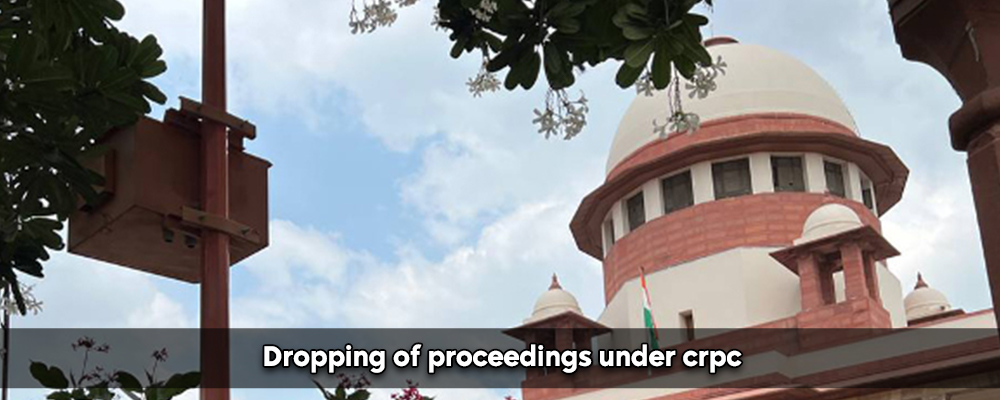The Code of Criminal Procedure (CrPC) in India provides a comprehensive framework for the administration of criminal justice. However, there are instances where the proceedings initiated under the CrPC may be dropped, reflecting the discretionary power vested in the legal system.
Dropping of Proceedings: About
- Dropping of proceedings refers to the decision by authorities or a court to cease legal actions against an accused individual. This can happen for various reasons, such as insufficient evidence, a settlement between parties, or considerations of public interest.
- Essentially, it involves discontinuing the legal process initiated against a person, leading to the termination of criminal charges or a case.
Need A Legal Advice
The internet is not a lawyer and neither are you. Talk to a real lawyer about your legal issue

Discretionary Power under CrPC
- The CrPC grants discretionary power to various authorities involved in the criminal justice system, allowing them to make informed decisions based on the merits of each case.
- Section 321 of the CrPC specifically addresses the power of the Public Prosecutor to withdraw from the prosecution of any person at any stage before judgment. This discretionary power is not absolute, as it is subject to certain conditions and considerations.
Conditions for Dropping Proceedings
- One of the primary conditions for dropping proceedings is the consideration of public interest. The Public Prosecutor must evaluate whether the continuation of the case is in the interest of justice and aligns with the broader public welfare. This ensures that the withdrawal of charges does not compromise the larger societal concerns associated with the alleged offense.
- In certain cases, where the dispute is of a private nature and the parties involved have reached a settlement, the Public Prosecutor may exercise discretion to drop proceedings. This acknowledges the principle that criminal justice should not be used as a tool for personal vendettas, and amicable settlements between parties may warrant the withdrawal of charges.
- If during the course of the proceedings, it becomes apparent that there is insufficient evidence to substantiate the charges, the Public Prosecutor may consider dropping the case. This is crucial to ensure that individuals are not unjustly persecuted based on weak or non-existent evidence, upholding the principle of fairness in criminal proceedings.
- Circumstances surrounding a case may change over time, influencing the decision to drop proceedings. For instance, new evidence may emerge, witnesses may retract their statements, or a change in the legal landscape may impact the prosecution’s case. The discretionary power allows for flexibility in responding to evolving situations.
Implications of Dropping Proceedings
- The discretionary power to drop proceedings contributes to judicial efficiency by preventing the unnecessary expenditure of time and resources on cases with weak foundations. This ensures that the legal system can focus on cases where the evidence is robust and the charges are well-founded.
- By allowing for the withdrawal of charges when there is insufficient evidence, the discretionary power safeguards innocent individuals from the trauma and consequences of unwarranted legal proceedings. This reinforces the fundamental principle of ‘innocent until proven guilty’ within the criminal justice system.
- Permitting the dropping of proceedings in cases of private settlements encourages the use of alternative dispute resolution mechanisms. This aligns with the global trend towards resolving disputes outside the courtroom, promoting a more collaborative and less adversarial approach to conflict resolution.
- The judicious exercise of discretionary power maintains public confidence in the criminal justice system. When the authorities demonstrate the ability to differentiate between cases that warrant prosecution and those that do not, it reinforces the perception of a fair and discerning legal system.
The discretionary power to drop proceedings under CrPC is a nuanced aspect of criminal justice administration in India. It provides legal authorities with the flexibility to assess cases on their merits and make decisions that align with the principles of justice and public welfare. While this power is a valuable tool in ensuring a fair and efficient legal system, its exercise must be guided by a commitment to upholding the rule of law and protecting the rights of individuals.
Striking the right balance between discretion and accountability is essential for maintaining the integrity of the criminal justice system and fostering public trust in the legal process.
One can talk to lawyers from Lead India for any kind of legal support. In India, free legal advice online can be obtained at Lead India. Along with receiving free legal advice online, one can also ask questions to the experts online free through Lead India.





 Talk to a Lawyer
Talk to a Lawyer